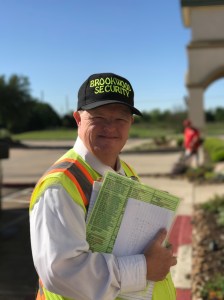
Yvonne Streit. Photo by Gary Coronado, Houston Chronicle.
When Yvonne Streit’s young daughter Vicki suffered brain trauma back in the 1960s as the result of complications from mumps, she found nowhere to turn for help. Programs to aid those with physical and intellectual disabilities in finding a way to contribute meaningfully to society were scarce at best. So Yvonne created one. While it began as a tiny project to aid special needs kids like her own, it eventually grew into the Brookwood Community, a world-class residential campus serving adults with disabilities by providing meaningful work.
Helping those with cognitive or physical disabilities begins with small but vital steps. In Vicki’s case, those steps involved Yvonne teaching her daughter over months to grasp, then grasp and release, then grasp, move, and release. Today Vicki has employed that skill to place plastic flowerpots on a palette as part of the horticultural team at a Brookwood. Vicki has placed over 11,000 pots and takes pride in her work.
Brookwood, which calls itself “a God-centered community,” is located not quite an hour outside Houston, TX. 120 residents live and work there, finding joy in community and in their paid jobs. Another 110 adults with disabilities commute to their jobs on campus. Everyone is called a citizen. And everyone experiences the dignity of contributing.
“You should see the looks on these citizens’ faces when they apply for a job, get a job, and get their paychecks every Friday,” says Yvonne, now 89. “Their work provides a sense of purpose.”
When asked about her theology of work, Yvonne recalls a statement she heard from a Harvard professor named James Helman. “He said that ‘work is not an ethic, it’s an instinct.’ I believe that is true. And I believe it is true for all people. Everyone needs to be needed.”
____________________________________________________________
“Work is an instinct. Everyone needs to be needed.”
—Yvonne Streit, Founder, Brookwood Community
____________________________________________________________
Brookwood’s beautiful 475-acre campus is marked by manicured lawns and elegant landscaping, a lovely chapel with stained glass windows, a rotunda, and an abundance of willow trees. But Yvonne believes it’s not enough to provide individuals with disabilities a beautiful place to live. They have something to offer the world, she argues. And that’s good for the world, and for them.
Brookwood staff seek to discern each citizen’s particular interests and skills and find employment that suits. Citizens try out different jobs, working with supervisors to find their best fit, based both on ability and preference. Then they apply to the job and receive an official job offer.

Bob. Photo by Kristin R. Owen.
Bob indicated that he wanted to work as security for the campus. He now has a uniform and helps the staff keep an eye on things. Another citizen was initially placed in the ceramics department helping to make pottery. But when staff realized that she loved washing dishes, she was put in charge of the paintbrush and bowl washing station.
Yvonne has found over the years that both the able-bodied and those with physical and mental challenges are often skeptical about the notion that people with disabilities can work. One woman who’d shown interest in joining Brookwood back in its early days threw a fit when staff started training her for her job. The behavior continued and finally this citizen told staff she was upset that they were asking her to try things that “she knew she couldn’t do.” But with time, this citizen realized that the staff believed she could do her assigned tasks—and in fact she did learn to execute them. She came to love her work so much that staff could hardly make her stop at the end of each work day.
Brookwood citizens, most of whom are engaged in some aspect of the community’s large ceramics production industry, are compensated for their work. Salaries are based on twice-yearly time studies of each employee in which staff measure each person’s productivity against a “neuro-typical” worker’s. Then the citizen is paid that percentage of minimum wage. The Department of Labor initially questioned the practice. But after visiting Brookwood, the bureaucrats changed their minds. They saw how life-enhancing the ministry was.
Yvonne explains that the citizens are partners in the operation of Brookwood and they feel a sense of pride. She’s not as concerned with producing products as she is with producing purpose. That is Brookwood’s primary goal, but as a by-product, they also create revenue that helps defray the community’s expenses. The rest of the budget is made up from fees the live-in residents pay as well as from charitable grants.
When asked what lessons she’s learned over her 50-year journey regarding how best to put people with disabilities to work, Yvonne says simply, “Just do something.” No one gets it perfect, she continued, but doing something rather than nothing is the next best thing. Start small, she counsels, and just continue to innovate.
Amy L. Sherman is a Senior Fellow at the Sagamore Institute and author of Kingdom Calling: Vocational Stewardship for the Common Good.

Thanks, Amy, for this important, good piece. So good to read this.
LikeLiked by 1 person